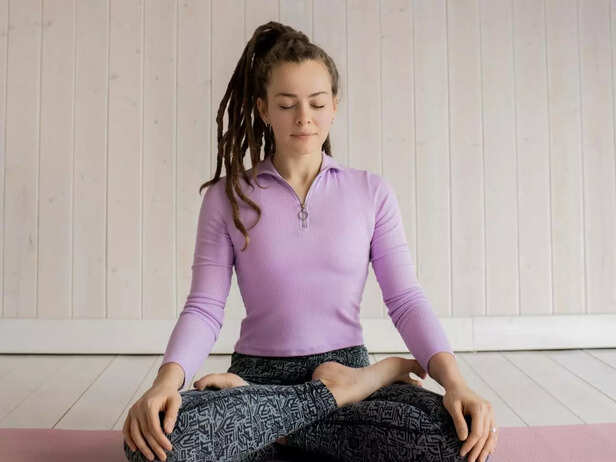Simple Daily Habits to be Calm
Ritika | Sep 30, 2025, 16:01 IST
A happy man
( Image credit : Pexels )
Life goes too quickly, and calmness is too often lost amidst noise. But calm does not come with retreats or high-end solutions. It emerges from common choices made every day, such as slowing down to breathe, eating without screens, going for a walk, or leaving space in our schedules. Calmness is not about eliminating issues; it's about walking with them without feeling crushed. Small habits help bring that change.
Stress creeps in from every corner. The honk of a car, the ping of a phone, one task piling on another. Calmness feels like something rare, almost like a reward people don’t have time for. But it doesn’t need to be.
The truth is, calm isn’t built on grand escapes. It comes from habits that look so small, they often go unnoticed. Things anyone can do, things that don’t need money or much time. Calmness doesn’t mean life is free of chaos. It just means learning to hold it without breaking under the weight.
Ordinary choices, done regularly, build the kind of balance people search for in big fixes.

Breathing happens without thought, yet the moment stress shows up, the pattern changes. Breaths shorten, the chest tightens, and suddenly, even sitting feels tense.
Taking a couple of minutes to take it down a notch can change the atmosphere of a whole day. Breathe in through the nose, hold for a tiny second, and then exhale slowly. Nothing radical, but the body listens. The heart slows, muscles release, the brain receives the message that things aren't breaking apart.
This is possible anywhere, on a bus, at a desk, even standing in line. The magic is in the simplicity of it. Done frequently enough, the body will begin to remember. Calmness need not wait for ideal conditions; sometimes it begins with paying attention to the air moving in and out.

Food today is consumed hurriedly. Individuals dine with one eye glued to a screen, occasionally not even being aware of what they just ingested. The hurried rhythm makes the stomach heavy and the head jumbled.
Dining slowly may seem too basic, but it does make a difference. Sit down correctly, chew for longer periods of time, savor the food; these minor alterations stabilize the rhythm. Digestion improves, but above all, the brain does not feel so much like it's in a frantic hurry.
When eaten slowly, food sustains differently. It becomes not just a filling of a void; it feels centering. Putting the phone down at the table might feel difficult, but it instills a type of pause that continues beyond the dinner table. Serenity, in large part, starts with how the body is treated.

Packed schedules make calm almost impossible. When every hour is stacked, one small delay feels like the whole day falling apart.
Lighter routines allow room to breathe. It doesn't equate to skipping duties; it means creating space between them. A minute gap, a time pocket with no task assigned, provides the mind with an opportunity to reboot.
Days packed edge to edge can appear streamlined, but they silently drain energy. A day that doesn't appear so "perfect" on paper tends to feel easier to bear. Quietness endures longer in routines that aren't bursting at the seams.

Nothing steadies the mind like being outdoors. Ten minutes outside, walking, standing, or simply looking around, rewinds something inside.
Fresh air, sunlight, sound of leaves, even urban sounds from a balcony, all remind the mind that life is greater than one stuffed to-do list. Stress hormones decrease with no effort. The shoulders relax. Breathing becomes different.
It doesn't have to be lengthy or elaborate. Even in urban cities, a brief step outside turns the mood around. Peace tends to linger outside, but people end up forgetting to open the door.

The mind is fast to latch onto what did not work. That argument, that procrastination, that incomplete task, it loops and loops. Gratitude breaks the cycle.
Catch three small good things every day. They don't have to be significant. It may have been a food that was just right, a compliment, a sunset. Writing them down or simply standing still to notice reframe things.
Problems don't go away, but they no longer feel so overwhelming when balanced with what is right. Over time, this habit calms the mind, opening up room for peace. Appreciation doesn't exist in dramatic moments; it exists in mundane ones.

Phones hardly ever stop ringing. Messages, emails, infinite scrolling all fill the mind with garbage. It often doesn't get stressful until restlessness sneaks up unannounced.
Cutting back makes a difference. A phone placed face-down at dinner. Notifications turned off. An hour of bedtime without screens. These small boundaries create quiet time.
Silence is not easy in today's world, but establishing limits brings it back to the table.

Without sleep, all else falls apart. Patience disintegrates, concentration wanders, even minor issues become insurmountable mountains. And still, sleep is the first to go.
Creating soft rituals around sleep time gets results. Keeping lights low, establishing a consistent sleep time, placing telephones beyond the bed. Swapping midnight scrolling for reading, stretching, or having a cup of tea, these minute adjustments smooth the body into slumber.
Good rest isn't only refreshing energy; it builds calm for the following day. Most calm mornings begin with what transpired overnight.

Tension is stored in the body, and movement releases it. Exercise isn't about being in shape; it's a brain reset.
It can't be a wild workout. Ten minutes stretching, walking, yoga, dancing in a room by yourself, all of those lower stress chemicals, and make space for endorphins.
Effort is less important than consistency. A little bit a day builds resilience. Quiet often follows movement rather than stillness.
Calm doesn't require big gestures. It resides in the daily practice of ordinary routines. Breathe slower, eat more slowly, go outside, write thank yous, sleep better, exercise the body, cut out digital noise; each of these adds up.
Life will never cease to provide deadlines, noise, and stress. Serenity does not eliminate them. It merely alters the manner in which they are borne. Tiny daily decisions, done enough times, tip the scales insensibly. And that is where peace starts, not out there somewhere, but amidst common life.
Explore the latest trends and tips in Health & Fitness, Spiritual, Travel, Life Hacks, Trending, Fashion & Beauty, and Relationships at Times Life!
The truth is, calm isn’t built on grand escapes. It comes from habits that look so small, they often go unnoticed. Things anyone can do, things that don’t need money or much time. Calmness doesn’t mean life is free of chaos. It just means learning to hold it without breaking under the weight.
Ordinary choices, done regularly, build the kind of balance people search for in big fixes.
Breathing with Intention

A woman meditating
( Image credit : Pexels )
Breathing happens without thought, yet the moment stress shows up, the pattern changes. Breaths shorten, the chest tightens, and suddenly, even sitting feels tense.
Taking a couple of minutes to take it down a notch can change the atmosphere of a whole day. Breathe in through the nose, hold for a tiny second, and then exhale slowly. Nothing radical, but the body listens. The heart slows, muscles release, the brain receives the message that things aren't breaking apart.
This is possible anywhere, on a bus, at a desk, even standing in line. The magic is in the simplicity of it. Done frequently enough, the body will begin to remember. Calmness need not wait for ideal conditions; sometimes it begins with paying attention to the air moving in and out.
Eating with Attention

A woman eating
( Image credit : Pexels )
Food today is consumed hurriedly. Individuals dine with one eye glued to a screen, occasionally not even being aware of what they just ingested. The hurried rhythm makes the stomach heavy and the head jumbled.
Dining slowly may seem too basic, but it does make a difference. Sit down correctly, chew for longer periods of time, savor the food; these minor alterations stabilize the rhythm. Digestion improves, but above all, the brain does not feel so much like it's in a frantic hurry.
When eaten slowly, food sustains differently. It becomes not just a filling of a void; it feels centering. Putting the phone down at the table might feel difficult, but it instills a type of pause that continues beyond the dinner table. Serenity, in large part, starts with how the body is treated.
Keeping Routines Light

A happy woman
( Image credit : Pexels )
Packed schedules make calm almost impossible. When every hour is stacked, one small delay feels like the whole day falling apart.
Lighter routines allow room to breathe. It doesn't equate to skipping duties; it means creating space between them. A minute gap, a time pocket with no task assigned, provides the mind with an opportunity to reboot.
Days packed edge to edge can appear streamlined, but they silently drain energy. A day that doesn't appear so "perfect" on paper tends to feel easier to bear. Quietness endures longer in routines that aren't bursting at the seams.
Stepping Outdoors

Jogging
( Image credit : Pexels )
Nothing steadies the mind like being outdoors. Ten minutes outside, walking, standing, or simply looking around, rewinds something inside.
Fresh air, sunlight, sound of leaves, even urban sounds from a balcony, all remind the mind that life is greater than one stuffed to-do list. Stress hormones decrease with no effort. The shoulders relax. Breathing becomes different.
It doesn't have to be lengthy or elaborate. Even in urban cities, a brief step outside turns the mood around. Peace tends to linger outside, but people end up forgetting to open the door.
Practicing Gratitude

Thank you note
( Image credit : Pexels )
The mind is fast to latch onto what did not work. That argument, that procrastination, that incomplete task, it loops and loops. Gratitude breaks the cycle.
Catch three small good things every day. They don't have to be significant. It may have been a food that was just right, a compliment, a sunset. Writing them down or simply standing still to notice reframe things.
Problems don't go away, but they no longer feel so overwhelming when balanced with what is right. Over time, this habit calms the mind, opening up room for peace. Appreciation doesn't exist in dramatic moments; it exists in mundane ones.
Reducing Digital Clutter

A girl using phone
( Image credit : Pexels )
Phones hardly ever stop ringing. Messages, emails, infinite scrolling all fill the mind with garbage. It often doesn't get stressful until restlessness sneaks up unannounced.
Cutting back makes a difference. A phone placed face-down at dinner. Notifications turned off. An hour of bedtime without screens. These small boundaries create quiet time.
Silence is not easy in today's world, but establishing limits brings it back to the table.
Sleeping with Care

Sleeping
( Image credit : Pexels )
Without sleep, all else falls apart. Patience disintegrates, concentration wanders, even minor issues become insurmountable mountains. And still, sleep is the first to go.
Creating soft rituals around sleep time gets results. Keeping lights low, establishing a consistent sleep time, placing telephones beyond the bed. Swapping midnight scrolling for reading, stretching, or having a cup of tea, these minute adjustments smooth the body into slumber.
Good rest isn't only refreshing energy; it builds calm for the following day. Most calm mornings begin with what transpired overnight.
Choosing Movement

A man exercising
( Image credit : Pexels )
Tension is stored in the body, and movement releases it. Exercise isn't about being in shape; it's a brain reset.
It can't be a wild workout. Ten minutes stretching, walking, yoga, dancing in a room by yourself, all of those lower stress chemicals, and make space for endorphins.
Effort is less important than consistency. A little bit a day builds resilience. Quiet often follows movement rather than stillness.
Wrapping Up
Life will never cease to provide deadlines, noise, and stress. Serenity does not eliminate them. It merely alters the manner in which they are borne. Tiny daily decisions, done enough times, tip the scales insensibly. And that is where peace starts, not out there somewhere, but amidst common life.
Explore the latest trends and tips in Health & Fitness, Spiritual, Travel, Life Hacks, Trending, Fashion & Beauty, and Relationships at Times Life!
